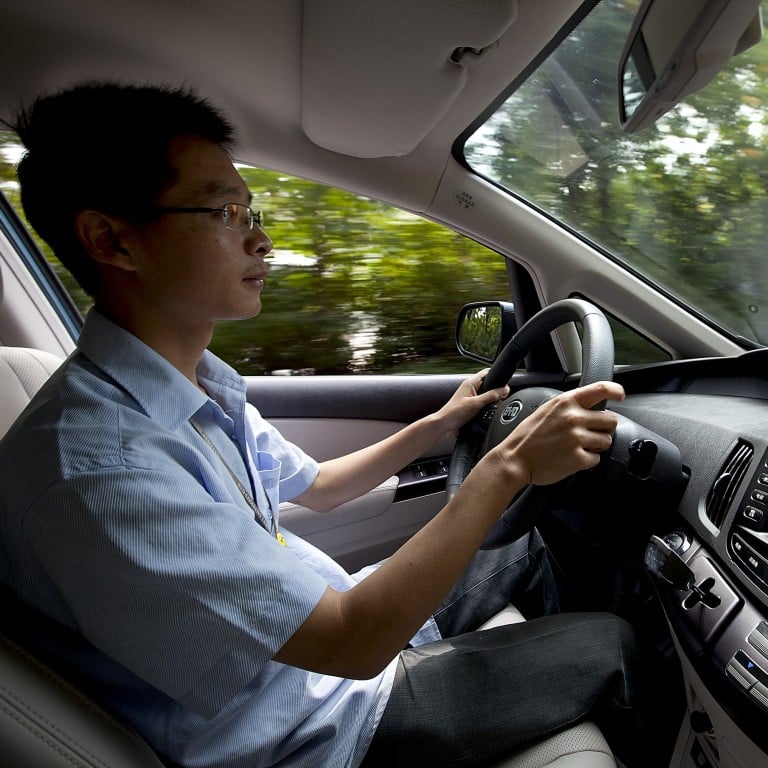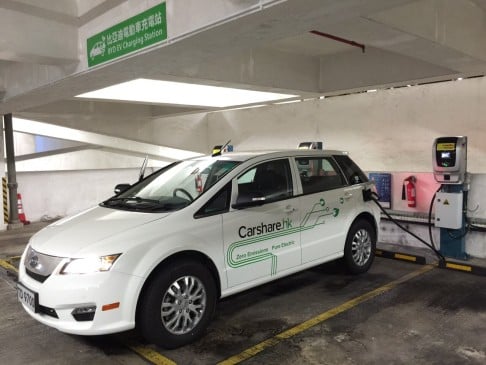
Hong Kong car-sharing start-up goes from strength to strength
Two years after sowing the radical idea of drivers renting their cars to others when not in use, Carshare.HK has electric car deal with BYD, has spread to Shanghai and is eyeing Shenzhen
Encouraging Hongkongers to loan their cars to complete strangers seemed like a radical idea. Nevertheless, when Christopher Yeung and his team pitched their Carshare.HK concept at a start-ups exchange at the CoCoon co-working space in Tin Hau in 2013, they walked away with the HK$20,000 first prize.
They had their first modest chunk of the HK$620,000 capital they were seeking to get Carshare.HK into gear.
Two years later, the start-up is going places. With 2,000 cars available for short-term rental to Carshare.HK’s 20,000 members, the venture has become an integral part of Hong Kong’s fringe sharing economy.
To spread the sharing creed, the company this month launched a project with Shenzhen-based carmaker BYD, to give members the chance to experience driving an electric car.

BYD has provided Carshare.HK with five of its e6 models for its first “ambassador sharing” programme. The five ambassadors, chosen from more than 100 applicants, have been given an e6 for two months, which other Carshare.HK members can rent for HK$199 a day, with a free battery recharge. Ambassadors who rent the e6 to 10 members a month will receive a parking voucher worth HK$995.
Carshare.HK co-founder and marketing officer Joyce Kan says the team was contacted by an angel investor shortly after they won the pitch at CoCoon, who invested HK$1 million in the venture.
“He likes cars a lot and had read the article about our pitch in the South China Morning Post, then approached us.
“That helped us to get everything started. Two or three months later, we were able to launch the website after we found a great designer and two web developers. Then we managed to close the insurance deal with DirectAsia.”
Carshare.HK enables owners who are not using their cars to rent them out to neighbours on their estate who may only occasionally need a vehicle for a few hours or a day. A wide variety of cars is available and prices vary. Carshare.HK says owners are making an average of HK$3,000 a month in rent. The start-up takes a commission from transactions on the platform, and takes care of identity verification, insurance and all other technical issues.
We’re so busy. Everyone is doing the work of two people
Kan says it was initially an uphill battle persuading people to share their cars with people they didn’t know, because it is a business based on trust. Insurance was also a major hurdle, because it was an unfamiliar business model that many insurers found too risky.
“When we launched, we only had five people willing to put their cars on our website,” Kan says. “But because the site has reviews [of owners’ and users’ reputations], and through word of mouth, more people have been willing to share their cars.
“It was a slower start than we expected because the sharing economy was not as popular at that time. Now there is GoGoVan, EasyVan and Uber in the transport segment of the sharing economy. In recent months, it has been growing faster. I think it’s a matter of timing. There is more news about start-ups now, and maybe that has helped.”

Carshare.HK’s founders also took heed of warnings from speakers at the CoCoon event that many local start-up ideas are not scalable beyond the small Kong market. The start-up is now established in Shanghai and has its eye on other cities in China, with Shenzhen the next target.
“We started out trial in Shanghai in May 2014 and got started in September. The competition is very intense because there are four or five peer companies doing the same thing,” Kan says. “In Shanghai, people are surprisingly open to new ideas and we had 3,000 car owners willing to share their cars within the first month.”
Kan says the start-up is now trying to raise its next round of funding for further expansion on the mainland. The team also wants to collaborate on sharing programmes with more carmakers similar to the BYD initiative.

Kan and Yeung are the only remaining members of the original Carshare.HK team of four. The other two have moved on to other ventures, and six new members have come on board, Kan says.
“We’re so busy. Everyone is doing the work of two people.”

